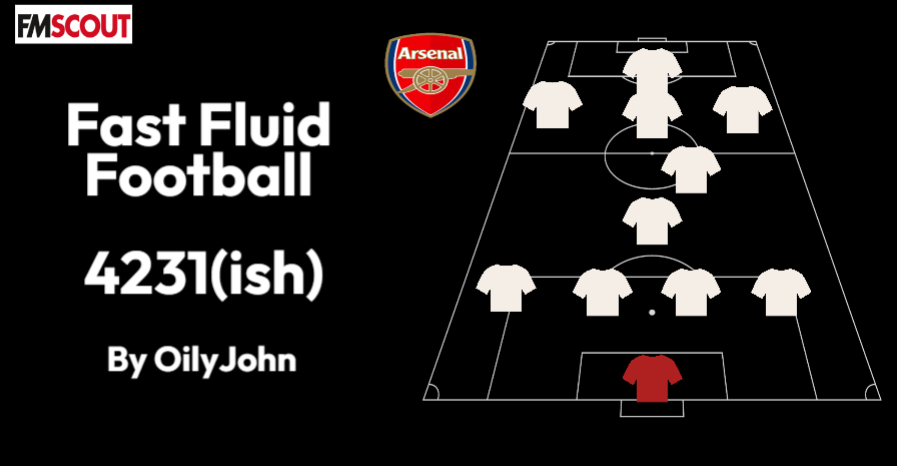
I've composed a list of some of the most commonly held ideas which regularly show up in some guise or another when members post seeking help with tactics.
The list is most definitely not exhaustive and I would appreciate if others more experienced and knowledgeable than me contributed to create a more comprehensive list as well as perhaps mentioning details I've overlooked that I could add to the ones already posted.
Originally written by pheelf on SI forums and published here with his kind permission.
#1 The names of mentalities denote precisely the type of football that a team will play
Attacking mentality =/= Attacking football, instead I think it's better to view mentalities as styles of play.
Mentality is shaped by the following factors: tempo, passing risk, roaming, width, pressing intensity, defensive line height, line of engagement, frequency of forward runs. Generally, it determines the amount of risks your players will be willing to take.
Therefore it's perfectly possible to be good defensively on a higher mentality and vice versa.
#2 The more TIs and PIs you use within a tactic the more 'advanced' it is
This is one which I see very often and is usually symbolized by an overkill of instructions within a tactic.
In my view, if you are having to select a lot of instructions then the base tactic isn't right. Another issue is what happens when you get into difficulty? How do you begin to unravel what is the cause with so many different variables?
You should be able to get close to a desired style of play without the need for a whole bunch of instructions with the formation, mentality and player roles and duties able to define the tactic.
#3 Selecting 'X' instruction guarantees my team perform 'X'
The best example I can give of this is when teams want to play out of defence and think that simply selecting the TI will make them play that way.
There is a lot more that goes into fulfilling an instruction than just selecting it. You need to have the right players and to have the correct base (formation, mentality, roles and duties) to consistently perform the action.
For e.g. If trying to play out from the back you need midfielders which position themselves deep enough to transition the ball from defence into the midfield.
#4 The descriptions given for the roles should be taken at face value
The problem with doing that is that there is no context given which can be misleading.
For e.g. A Poacher in a system with a cautious team mentality is going to behave very differently than one in a positive team mentality. Also, a lone Poacher is again going to behave completely different than one flanked with a Target Man.
This is where watching matches in detail from time to time can be very helpful as instead of judging a player on what you think they should be doing you are actually assessing what they are doing.
#5 Player role and positional familiarity dictates how I should utilize a player
The familiarity a player has in a role can be a useful bit of knowledge to have but it also must be contextualized.
A favoured role of a player might not necessarily fit into the approach you want your team to play and can actually disrupt it if it's completely wrong.
Football is a team game, you'll get far more out of player in a role which they aren't particularly suited to that fits the tactic than trying to play a player in a favoured role which doesn't suit the tactic.
#6 The analysis tab on the tactic always gives correct information
Another one of those issues where the tactical creator itself presents misleading information.
For e.g. I'm playing a 4-4-2, I have my central midfield pair setup with one on the defend duty and the other on the support duty. According to the analysis you will see an orange patch in front of the central midfielder on the defend duty. Now if I change his duty to support that patch will become green which logically will bring the conclusion that is a better way to setup the tactic.
That is completely wrong as it would mean you have no holding midfielder and much like many other aspects of tactical analysis offered by the game lacks any form of context.
#7 Formation should be an after thought when it comes to deciding on a style of play
This sort of thinking is perhaps encouraged by the preset tactical styles which have a set of 3 formations you can use for each.
The way I see it the formation you choose is the single most important decision you will make when deciding how you want your team to play as it defines the starting point for the majority of your attacks and sets the base for where and how your team defends.
For e.g. You decide you want to play a short passing possession based style but then you pick a formation which has players spread all over the pitch, the two won't work well with each other.
#8 The way to get around defences is to pile players forward
I'm not sure where this idea originates from but is deeply flawed.
To break down a defence you need good width, good depth and good movement in front of the ball in order to create space for your attacking players by pulling the oppositions defenders out of position.
That is why I don't understand why so many tactics seek to flood the central areas and compress the pitch as that works entirely contrary to what you need.
#9 The profile of players is irrelevant when deciding how I want the team to play
Once you have decided on a style of play you must also ensure that the players you have can actually pull it off.
For e.g. Playing a gegenpressing style with lazy players is a recipe for disaster.
Sometimes you have to be willing to compromise in the present until you can reshape the team and have it playing the way you want in the future.
#10 The match stats are in my favour so therefore I must be dominating the other team
Don't allow yourself to be fooled by statistics as they can be very misleading.
The only statistic that matters is the scoreline and if you are under performing in that respect that should be the only vector which you use to determine whether you are dominating the opposition or not.
The other aspect of statistics is that any context behind them is lost. Yeah, you might be peppering the opposition goal with shots but how many of them are of genuine quality?
#11 The only contradictions that exist are ones where TIs conflict so aren't select-able
It is very easy to believe this but in reality isn't correct.
Sometimes the contradiction that exists doesn't even need to be one based on a particular TI. For e.g. Trying to play out of defence while on the Very Attacking mentality in itself is a contradiction.
Another is trying to prevent the GK from distributing the ball short with a lone striker in a flat 4-1-4-1 for example.
#12 TIs and PIs override existing instructions
All TIs and PIs are additive to the base settings of mentality.
This can be problematic to deal with as everything in the tactical creator tends to be kind of vague.
For e.g. instructions telling players to play a higher tempo than they would on the Positive mentality but what does that actually mean? That's why I think it's better to avoid that minefield altogether by selecting minimal TIs.
#13 Any difficulty I encounter with my teams performances must be a result of a tactical issue
This is where sometimes players can become stuck and get frustrated and end up in a vicious circle of constantly making tactical changes in the hope it improves things when it doesn't.
There is more to a teams performances on the pitch than tactics. Squad management has to be good, playing the right players in the right roles is also important.
Also there are some occasions where you can't tactic your way out of a situation which is actually fairly realistic when you think about it.
#14 Using theory alone will allow me to build good tactics
It's always a good thing when players seek to increase their knowledge of the game by reading guides and watching videos but you also need to know when to stop.
Otherwise, you can end up with information overload and actually end up being unable to assimilate all the knowledge you have gained.
Once you've read or seen something which you want to try, go into the game and test it out, that way you can see if you have fully understood the concepts.
#15 You need to use 'exploit' tactics to consistently overachieve
Nope, it is perfectly possible to overachieve with basic but balanced tactics.
Improving other aspects of your game such as squad building and man management can have as powerful an impact.
There is no doubt that there will always be some exploitable area of the ME which you can use to gain an advantage but you don't need to use it to do well.
#16 I can ignore hidden attributes and PPMs as their impact is minimal
This couldn't be further from the truth as the impact of PPMs especially has dramatic impacts on the way your players perform the roles you set for them.
I learnt this the hard way as I was left wondering why my team could perform so well domestically but regularly capitulated in Europe.
The answer was that a lot of my players dreaded playing in big matches. Once I moved a lot of those players on and brought in players more comfortable playing in big matches I saw a dramatic improvement.
#17 I should always take my assistants advice
I don't trust my assistants advice at all and don't allow him to select a team without perusing it myself.
I see a lot of players going with the assistants advice on oppositions instructions which again is a very risky ploy.
My advice would be to look at what your assistant is telling you but always make the final decision and base it on what you are seeing.
#18 The only players which can be playmakers are designated playmakers
The truth is that any player can perform the act of creating plays for their team mates.
When deciding to utilize a playmaker it should always be done considering how funneling play though a particular player impacts your attacks.
It's also very important to give your playmakers options when they receive the ball. You also need to ensure you have the right sort of player in the role.
#19 The only attributes I should consider for a role are the ones which are highlighted as being key
There is where context becomes important.
For e.g. You have decided to play a gegenpress 4-4-2 and have a Target Man and Poacher partnership upfront. If you were to go solely on what the game tells you then attributes such as work rate and stamina aren't considered important. However, it's very important in a gegenpress for them to have these attributes to be able to consistently press hard and high up the pitch.
Therefore you need to look at how you have set your team up as a whole when deciding what attributes you need from your players.
#20 All the aspects of creating tactics should be considered disparate
If there is anything which provides the biggest stumbling block for a lot of players it is this and is something which I've also struggled with in the past.
Viewing things in isolation is never a good thing and while it can be difficult to coalesce a bunch of different concepts to form a coherent whole it is a fundamental building block of creating solid tactics.
Everything in a tactic should harmonize and work together. The formation, the mentality, the player roles and duties, the TIs and PIs, the OIs and the players themselves should be geared towards the vision of how you want your team to play. Having any of those aspects working against that vision will cause problems so it's vital that it's done right.
Hopefully, what I've written helps other players of the game to avoid some of the traps and pitfalls I've experienced while playing FM and at least gives them some pause for thought when it comes to how they go about designing tactics. If I've done that then I'll consider it a job well done.





![FM26 Data Tweaks [v1.7 | v3.0]](https://i.postimg.cc/t4fKVrB7/wonderkid.png)





Discussion: Common Misconceptions When Building Football Manager Tactics
4 comments have been posted so far.